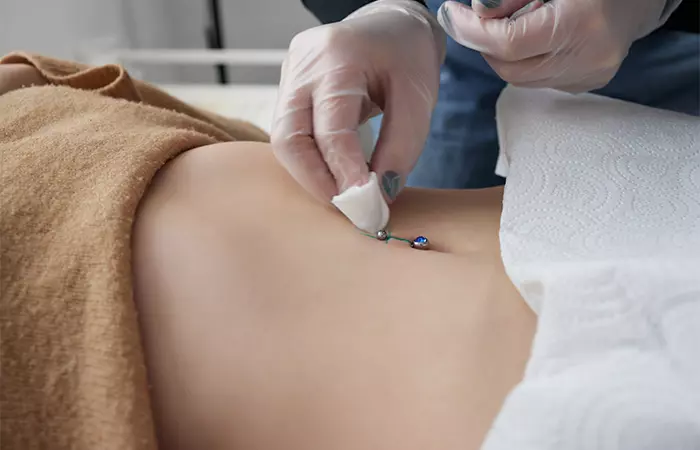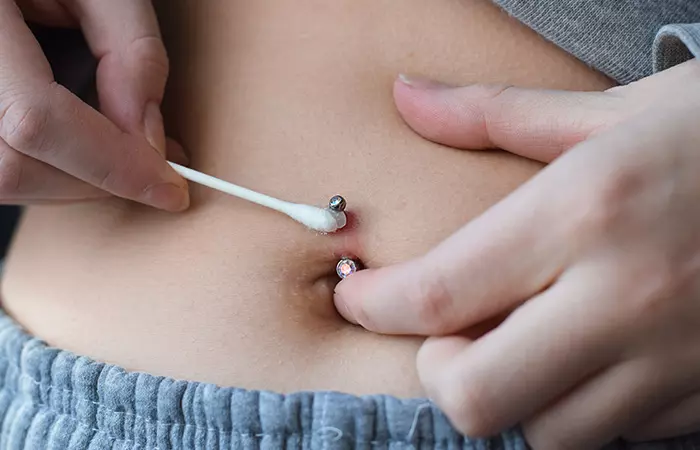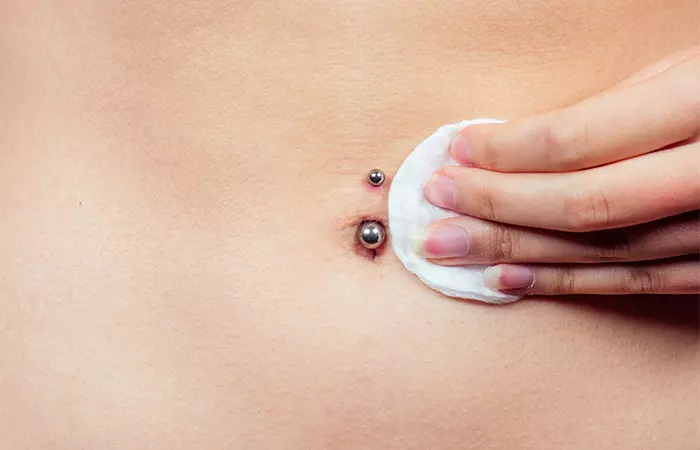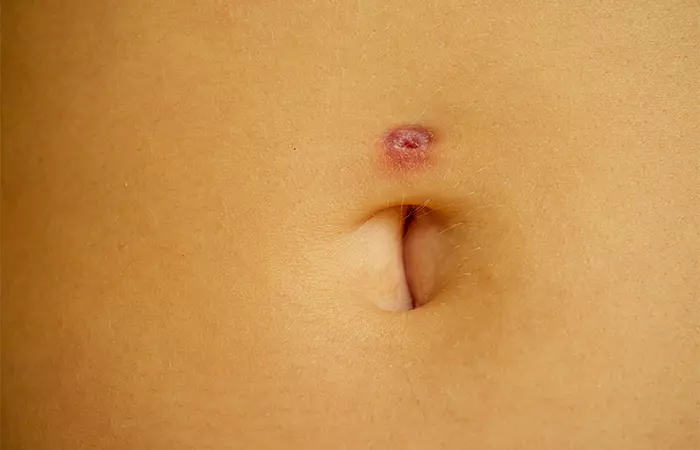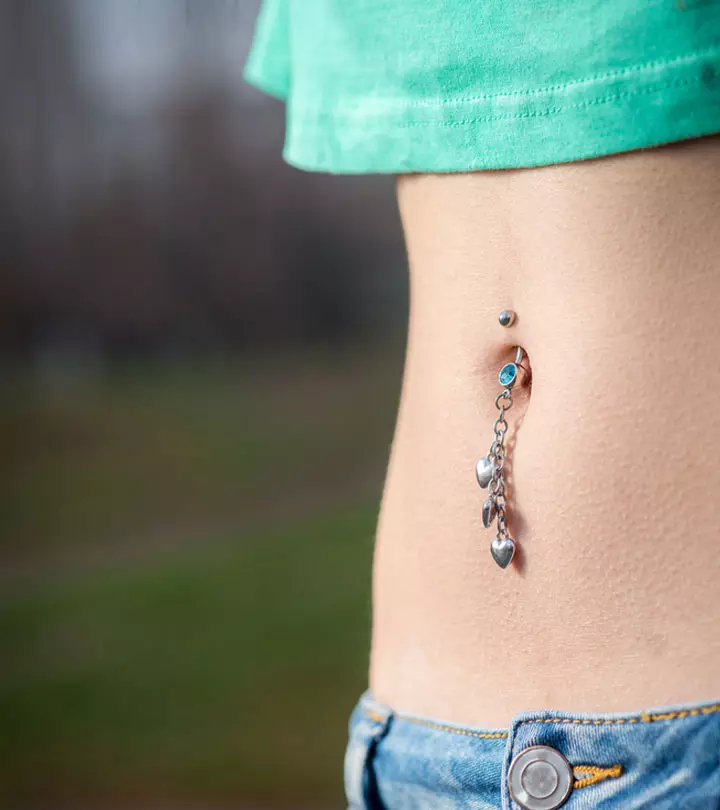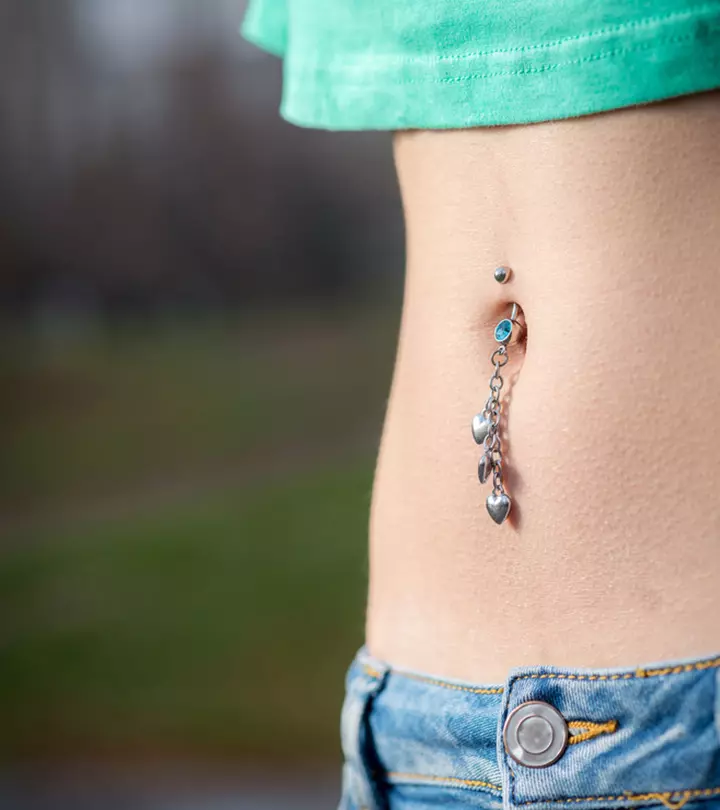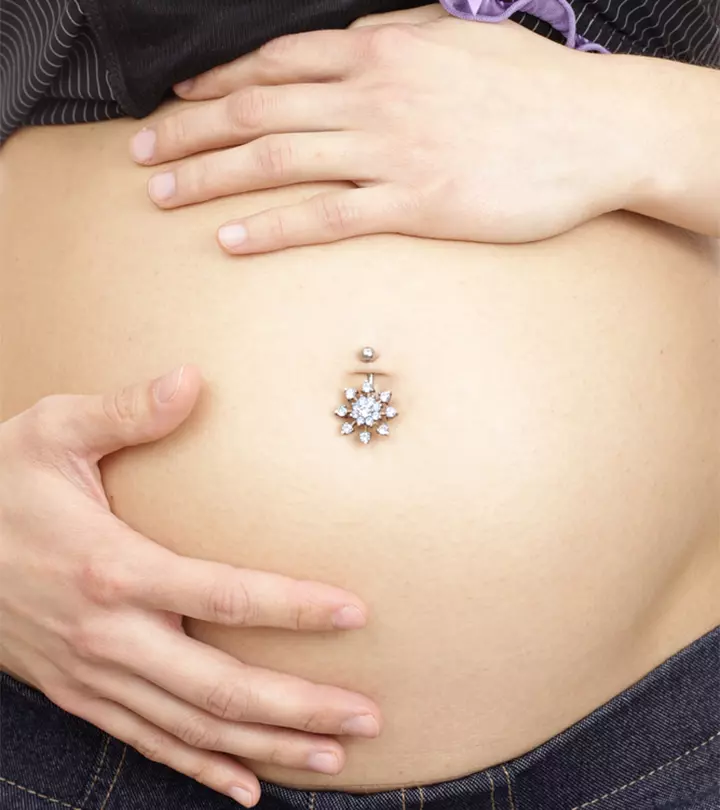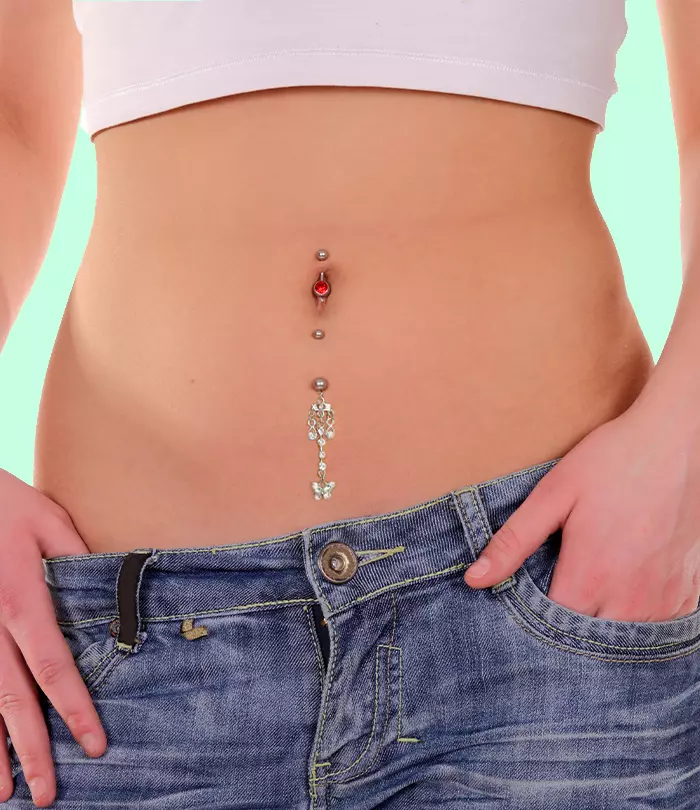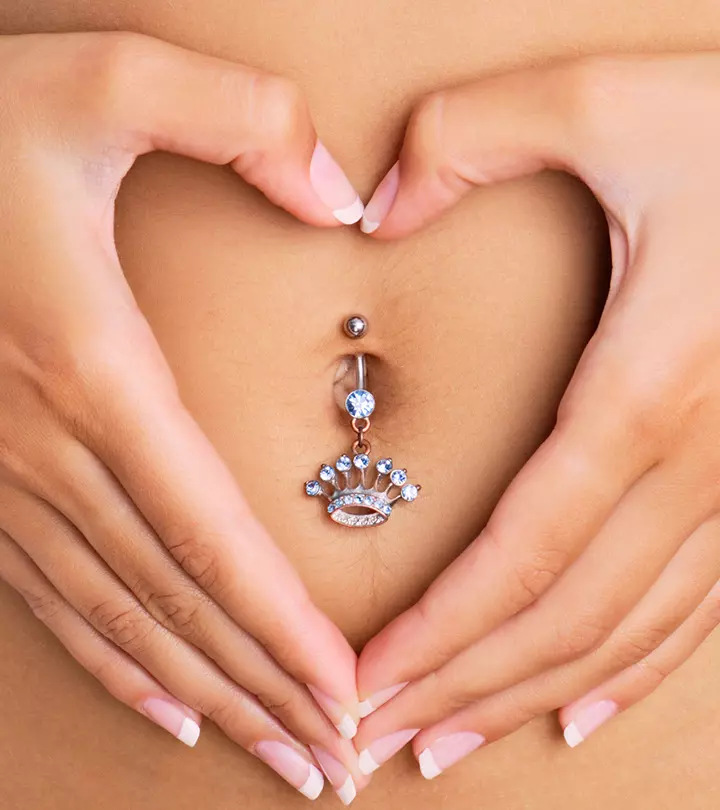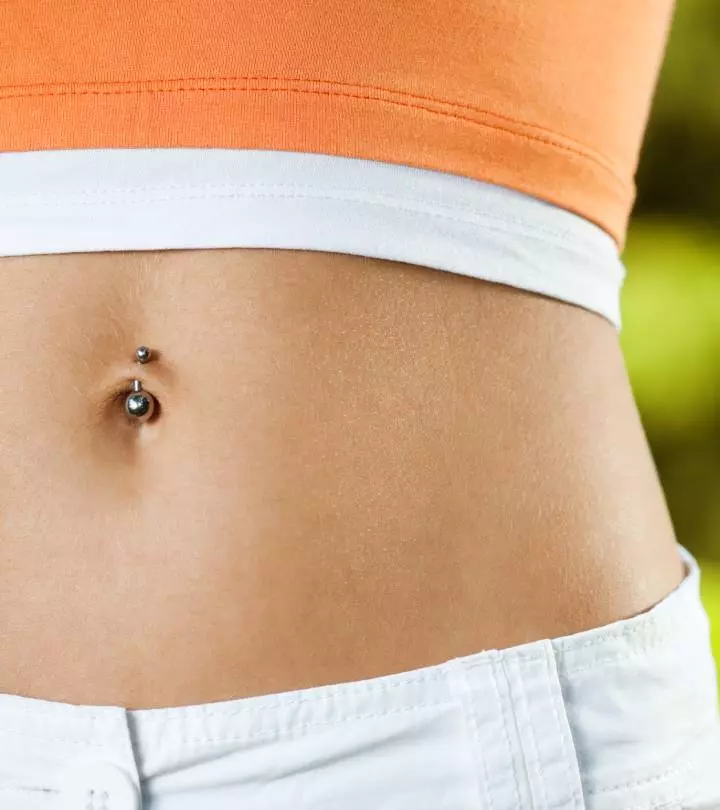Infected Belly Button Piercing: Treatment & Cleaning Tips
Heal your piercing infection with effective strategies and essential aftercare tips.
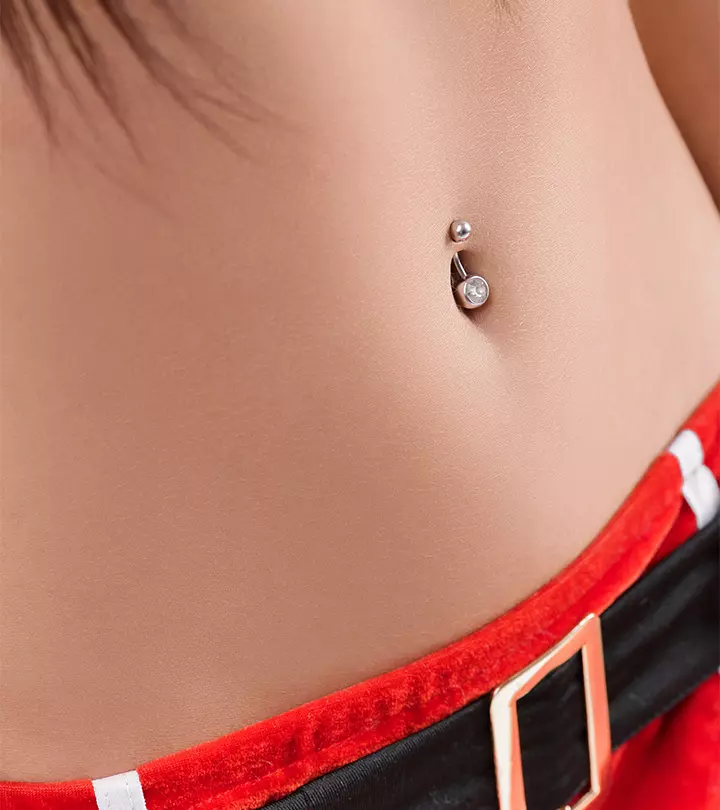
Image: Shutterstock
Belly button piercings are a coveted piercing placement, especially among the younger population. Unfortunately, incidence of infected belly button piercings are just as common. An infected belly button is a common occurrence primarily due to its susceptibility to irritation, often triggered by factors such as clothing friction and unhygienic piercing conditions.
While this trendy and stylish means of self-expression enhances the charm of the navel area, it is also necessary to recognize the frequent incidence of infections in this sensitive region. Nevertheless, diligent aftercare practices and regular cleaning of the area can significantly improve the overall condition. Therefore, it is important to know more about belly button piercing infections before you decide to get one for yourself.
From the causes of infection and symptoms to prevention tips, read on to be better armed with the required knowledge to flaunt this piercing fashion statement.
In This Article
What Causes Belly Button Infections?
Belly button piercing infections can arise from various factors, such as the following:
- Location: The navel area is in constant contact with fabrics, and tight or abrasive clothing can create a conducive environment for irritation, resulting in infections.
- Jewelry Materials: Poor-quality or non-hypoallergenic materials may result in irritation and harbor more bacteria, increasing the risk of infection.
- Lack Of Expertise: A skilled and experienced practitioner understands the importance of hygiene and the correct techniques for piercing, whereas an unskilled piercer will not be able to ensure a clean and precise procedure that minimizes tissue trauma.
- Improper Hygiene Practices: Improper handwashing and sanitization of tools is bound to introduce bacteria to the piercing site.
- Inadequate Aftercare: Not cleaning your piercing site regularly or taking good care of it can cause improper healing and increase the risk of infection.
Infections, notably bacterial and viral, are the most prevalent concerns after a belly button piercing. Keep reading to know more about the symptoms of an infected piercing.
Symptoms Of A Belly Button Piercing Infection
Monitoring for unusual signs can help identify if your belly button piercing is infected. Some of these signs include:
- Painful Swelling: An infected belly button piercing can cause swelling, ranging from mild irritation to the formation of an abscess. The affected area might feel warm to the touch, suggesting different levels of infections, where some types might need drainage.
- Skin Redness: Infections may appear as distinct changes in the skin color, showing up as bright red marks or discoloration.
- Pus Formation: If your belly button piercing is infected, you might notice pus discharge, and the color could vary from yellow, green, gray, and brown to bloody red. If the discharge has an unpleasant smell, it strongly indicates an infection.
- Fever And Chills: Though relatively uncommon, an infection can make you feel generally unwell, with symptoms like fever and chills. In severe instances, the body’s reaction to the infection may escalate to sepsis, demanding prompt medical attention.
Identifying these symptoms can help you treat the piercing infection as soon as possible. However, the symptoms of an infected belly button piercing, such as swelling, redness, and pus discharge, can be similar to those caused by an allergic reaction to metals. Keep reading to know more.
Symptoms Of Metal Allergies
While the charming jewelry for a belly button piercing adds allure to the navel, it is essential to be cautious about potential allergic reactions, particularly for individuals sensitive to materials like nickel.
If you are allergic to the metal used in your belly button piercing, you may experience the following allergic reactions:
- An itchy, inflamed rash around the piercing that spreads.
- The pierced hole appears larger than before.
- Tenderness in the pierced area.
In such cases, it is best to opt for hypoallergenic metals. Some of the safe metals for body piercings are:
- Surgical stainless steel
- Solid 14-karat or 18-karat gold
- Niobium
- Titanium
- Platinum
Therefore, it is important to understand if the unusual reactions are due to an infection or allergy. Identifying the symptoms and the cause of infection can help treat the healing piercing accurately and efficiently. Read on to learn how to treat it.
How To Treat An Infected Belly Button Piercing
If you feel like your piercing is infected, it is best to start the treatment right away. To treat it, you have to follow the steps below:
- Avoid removing the jewelry unless advised by your piercer or doctor.
- Clean the piercing at least twice a day with a saline solution followed by a mild antibacterial soap.
- Ensure you wash your hands before touching the infected area. Washing them thoroughly is crucial to prevent introducing more germs to the infected belly button piercing.
- Rotate the jewelry all the way around while cleaning it to eliminate any bacteria on the exposed part of your belly button.
- Use a cotton swab and cleaning solution to gently wipe the area around your belly button and the ring. Pat the region dry with a clean paper towel.
- Apply a warm compress to the infected piercing to reduce swelling and facilitate pus drainage.
- Apply an over-the-counter antibacterial cream to treat the infection and support the healing process.
- Seek immediate advice from a dermatologist if the infection does not subside after 2 to 3 days.
Maintaining a clean pierced area can help treat infections as well as promote healing. However, you should be careful while cleaning the piercing area. Check out the next section for proper cleaning techniques.
How To Clean An Infected Belly Button Piercing
Follow the steps below for a thorough cleaning of your belly button piercing:
- Wash your hands with antibacterial soap and warm water.
- Prepare a saline solution by mixing half a teaspoon of salt into a cup of warm water.
- Cleanse the piercing holes and your belly button with a Q-tip or cotton ball soaked in the saline solution or with a mild antibacterial soap.
- Rotate your piercing at least 4 times after cleaning the area.
- Repeat the whole process once or twice daily until the healing period redness, swelling, and discharge subside.
A beauty and lifestyle blogger shared that she used to apply a piercing aftercare spray and an antibacterial wash to reduce the redness. She also added that salt solution is a wonderful remedy for healing belly button piercings, stating, “I do salt soaks at least once a day. I realized some slight pus coming out from my lower hole when I stopped the salt soaks, yikes. So yes salt soaks are miraculous!! (i)”
 Quick Tip
Quick TipWhile these cleaning tips help heal infections, preventing them is putting your best foot forward. But how do you avoid the infection? What can you do to prevent it? Keep reading to learn some tips.
9 Tips To Avoid A Belly Button Piercing Infection
Care is of utmost importance to ensure proper healing and prevent complications. Below are a few aftercare tips that can help prevent belly button piercing infection:
- Wear loose and airy clothing that does not stick close to your skin.
- Sit up straight so that the jewelry does not press into the skin.
- Steer clear of bathing in hot tubs, swimming pools, strenuous exercises, or contact sports.
- Avoid consuming alcohol and tobacco. Eat healthy and get enough sleep to ensure proper healing.
- Choose a licensed professional piercer to get your piercing. Talk to them, read reviews, and check their previous works before finalizing.
- Consult your piercer before choosing the best metal for your piercing. Do not skimp on quality to cut costs.
- Clean the jewelry and pierced area twice a day with saline solution. You may also wash it while showering with warm water.
- Sleep on your back to prevent irritating the belly button piercing.
- Always wash your hands with soap before touching the pierced area.
 Quick Tip
Quick TipYou may do light exercises even after getting a belly button piercing, but ensure you cover the area with a large bandage to avoid irritation from sweat accumulation.
While many infections can be managed at home, if the symptoms persist or worsen, it is important to seek advice from a healthcare provider; some cases may require additional care and professional help. Read on to know more about when to consult a doctor for a belly button piercing infection.
When To See A Doctor
If you start feeling increasingly unwell, or if the swelling and redness persist or worsen despite home treatments, you may need to seek medical advice. Additionally, if you notice significant signs of infection, particularly fever or nausea, it is best to contact your doctor promptly. Even seemingly minor infections can escalate without proper treatment. In such cases, a healthcare provider may prescribe a prescription antibiotic ointment or oral antibiotics.
You may get an infected belly button piercing due to various factors, including the piercing location, materials used, lack of practitioner’s expertise, improper hygiene practices, and inadequate aftercare. The symptoms of infection include painful swelling, skin redness, pus formation, and systemic signs like fever and chills. While treating infections involves proper care and the use of antibacterial measures, it is important to differentiate between an infection and metal allergy. Preventive measures, like wearing loose clothing, maintaining good posture, and avoiding specific activities, are key to reducing the risk of infections. Even though most mild infections can be managed at home, it is necessary to consult a doctor if symptoms persist or worsen.
Frequently Asked Questions
Can a belly button infection kill you?
While extremely rare, severe complications from an untreated belly button infection could potentially lead to life-threatening conditions like sepsis (1).
Will a belly button or navel infection go away on its own?
No, it will not go away on its own. You need to maintain proper hygiene and provide care to resolve a belly button piercing infection.
What antibiotics are commonly prescribed for belly button piercing infections?
Commonly prescribed antibiotics may include topical creams like Mupirocin (Bactroban) or oral antibiotics such as Cephalexin or Clindamycin (2). However, the specific antibiotic cream and form of medication can vary based on the severity of the infection and the individual’s medical condition. Hence, it is always better to consult a medical professional before administering any kind of medication.
Key Takeaways
- Belly button piercing infections may result from factors like the piercing location, materials used, lack of practitioner expertise, improper hygiene practices, and inadequate recipient aftercare.
- The symptoms include painful swelling, skin redness, pus formation, or systemic signs like fever and chills.
- Proper cleaning and timely treatment are essential for successful belly button piercing care.
- Avoid hot tubs, pools, and heavy workouts to help prevent belly button piercing infections.
If your belly button piercing becomes infected, the initial remedy is thorough cleaning. If you are looking for ways to heal the infection, watch this informative video for guidance on healing an infected belly button. Click play now!
Personal Experience: Source
StyleCraze's articles are interwoven with authentic personal narratives that provide depth and resonance to our content. Below are the sources of the personal accounts referenced in this article.
(i) Navel piercing cleaning procedurehttps://beautyandbodypiercings.blogspot.com/2015/08/navel-piercing-cleaning-procedure.html
References
Articles on StyleCraze are backed by verified information from peer-reviewed and academic research papers, reputed organizations, research institutions, and medical associations to ensure accuracy and relevance. Read our editorial policy to learn more.
- Body piercing with fatal consequences
https://www.ncbi.nlm.nih.gov/pmc/articles/PMC3062280/# - Body piercing infections
https://www.ncbi.nlm.nih.gov/books/NBK537336/
Read full bio of Madhumati Chowdhury
Read full bio of Aparna Harry




